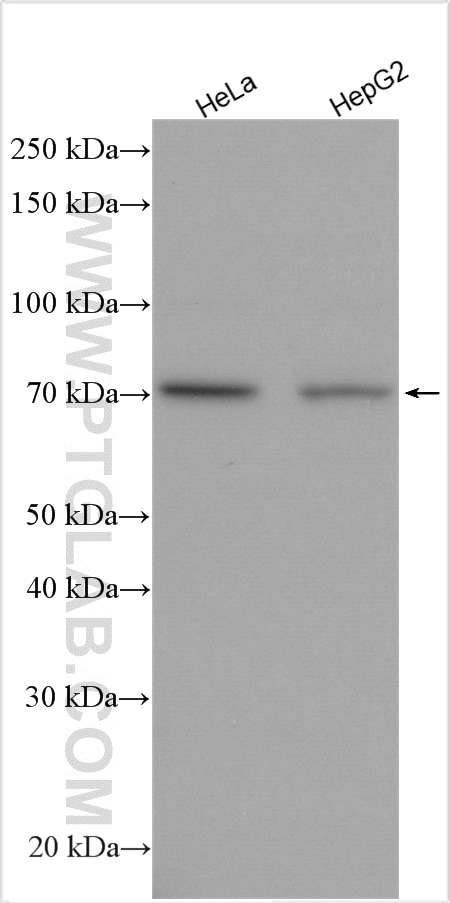Validation Data Gallery
Filter:
Tested Applications
| Positive WB detected in | HeLa cells, HepG2 cells |
Recommended dilution
| Application | Dilution |
|---|---|
| Western Blot (WB) | WB : 1:500-1:2000 |
| It is recommended that this reagent should be titrated in each testing system to obtain optimal results. | |
| Sample-dependent, Check data in validation data gallery. | |
Published Applications
| WB | See 2 publications below |
Product Information
25649-1-AP targets TNFAIP2 in WB, ELISA applications and shows reactivity with human samples.
| Tested Reactivity | human |
| Cited Reactivity | human, canine |
| Host / Isotype | Rabbit / IgG |
| Class | Polyclonal |
| Type | Antibody |
| Immunogen | TNFAIP2 fusion protein Ag19150 相同性解析による交差性が予測される生物種 |
| Full Name | tumor necrosis factor, alpha-induced protein 2 |
| Calculated molecular weight | 654 aa, 73 kDa |
| Observed molecular weight | 73 kDa |
| GenBank accession number | BC128449 |
| Gene Symbol | TNFAIP2 |
| Gene ID (NCBI) | 7127 |
| RRID | AB_2918092 |
| Conjugate | Unconjugated |
| Form | Liquid |
| Purification Method | Antigen affinity purification |
| UNIPROT ID | Q03169 |
| Storage Buffer | PBS with 0.02% sodium azide and 50% glycerol , pH 7.3 |
| Storage Conditions | Store at -20°C. Stable for one year after shipment. Aliquoting is unnecessary for -20oC storage. |
Background Information
TNFAIP2, also named as B94, belongs to the SEC6 family. TNFAIP2 may play a role as a mediator of inflammation and angiogenesis. TNFAIP2 is differentially expressed in development and capillary tube-like formation in vitro. It is induced by TNFα and other proinflammatory factors.
Protocols
| Product Specific Protocols | |
|---|---|
| WB protocol for TNFAIP2 antibody 25649-1-AP | Download protocol |
| Standard Protocols | |
|---|---|
| Click here to view our Standard Protocols |
Publications
| Species | Application | Title |
|---|---|---|
Cell Commun Signal NEDD4L mediates ITGB4 ubiquitination and degradation to suppress esophageal carcinoma progression |
